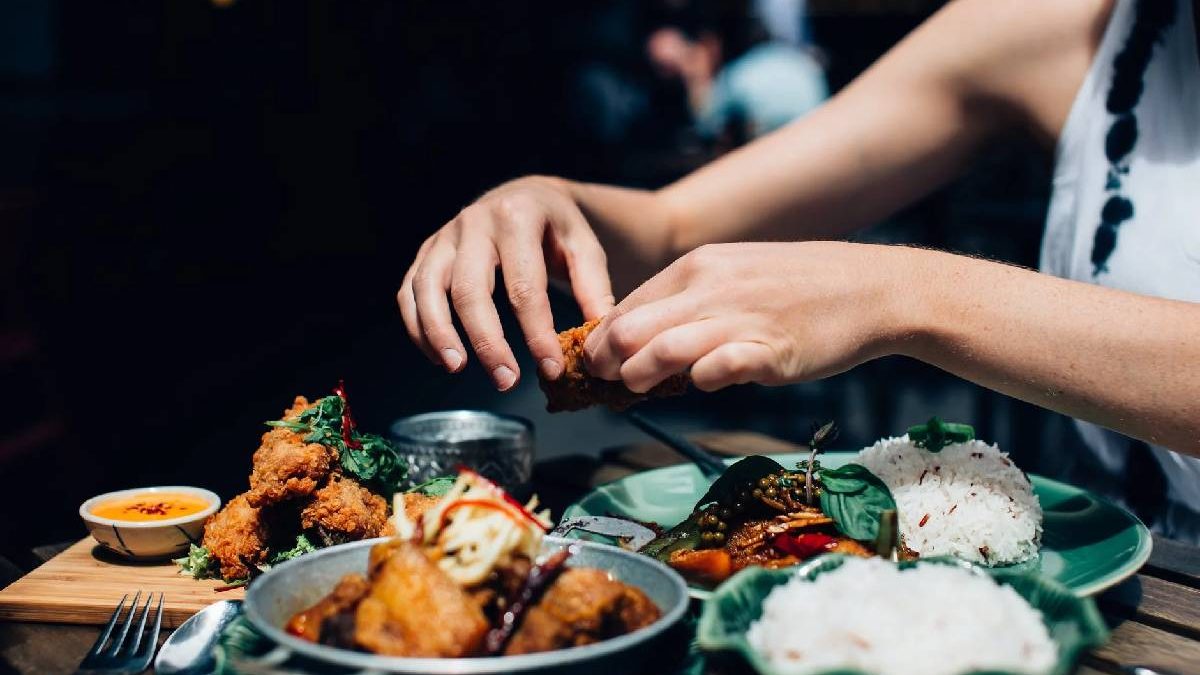The concept of intuitive eating can seem incredibly liberating, or for some, just a natural way of being. However, for those individuals that have struggled with a yo-yo or crash dieting their entire lives, merely listening out for hunger cues or being in tune with your body’s needs seems like an impossible goal.
Many people were raised with diet culture and are currently trying to exist peacefully in its aftermath, particularly those left with harrowing eating disorders. Intuitive eating can be an excellent tool for those who struggle with EDs, but some believe it can be challenging to achieve when your body’s signals are all out of whack. The key, however, lies in transitioning from a lifestyle of structure and control to instinct. Here’s how it works:
Table of Contents
What Is Intuitive Eating?
The basics of intuitive eating involve eating when you’re hungry and stopping when you reach satisfaction. When you embark on an intuitive eating plan, the goal is to let go of the idea that dieting is a viable avenue toward becoming healthy. This is because diets, for the most part, are unsustainable and will cause people to jump from one to the next when they become discouraged with their results. Chances are, you’re also not getting the nutrients your body needs to function optimally. It’s also a slippery slope to developing a full-blown eating disorder.
Intuitive eating is all about taking a leap of faith and trusting that your body knows what sustenance it needs and when it needs it. Dieting typically involves a degree of restriction and feeling hungry. At the same time, intuitive eating encourages eating when you’re hungry to not end up overeating or bingeing due to said restriction.
Intense cravings are also the result of depriving yourself of certain food groups, such as sugar, for example, and can potentially lead to binge eating. Intuitive eating promotes moderation; in other words, eating a piece of candy every once in a while will not make you gain weight. What matters is the quality of your foods over time.
Benefits of Intuitive Eating
The ultimate goal of eating disorder recovery is to return to intuitive eating. However, this is not the first step toward recovery. After a period of eating structured meals to restore healthy hunger and fullness cues, only then will patients begin to practice intuitive eating. Ideally, the patient will also embark on this journey with the guidance of a dietitian that specializes in eating disorder treatment. BetterHelp has plenty of resources on eating disorder recovery if you’d like to learn more. After this process, however, individuals who practice intuitive eating can experience various life-changing benefits that can work to heal one’s relationship with food for the long term. Among them are:
- Higher self-esteem
- Healthy coping mechanisms
- Pleasure around eating
- Healthy cholesterol levels
- Optimism and generally better mental health
- Comfort with trying different foods
- Body acceptance
How Does It Apply To Eating Disorder Treatment?
After undergoing a lengthy period where the body was put under stress and deprived of nutrients, those who suffer from eating disorders must take action to nurture their bodies with a bit of tenderness, love, and care. When the body has lost touch with itself and cannot recognize typical hunger cues, it’s encouraged for patients to eat regularly to prevent purging or bingeing. Evelyn Tribole and Elyse Resch, the originators of the concept, describe the principles of intuitive eating as they are to be applied to eating disorder treatment. They include:
- Challenge negative judgments toward food to expand your food options.
- Identify and develop healthy coping strategies to manage eating disorder behaviors.
- Heal a distorted body image and achieve body neutrality.
- Introduce exercise in moderation and learn skills to avoid over-exercising
- View nutrition and all food groups as a means for health, not as an indulgence that must be heavily restrictive.
Marie Miguel Biography
Marie Miguel has been a writing and research expert for nearly a decade, covering a variety of health- related topics. Currently, she is contributing to the expansion and growth of a free online mental health resource with BetterHelp.com. With an interest and dedication to addressing stigmas associated with mental health, she continues to specifically target subjects related to anxiety and depression.

